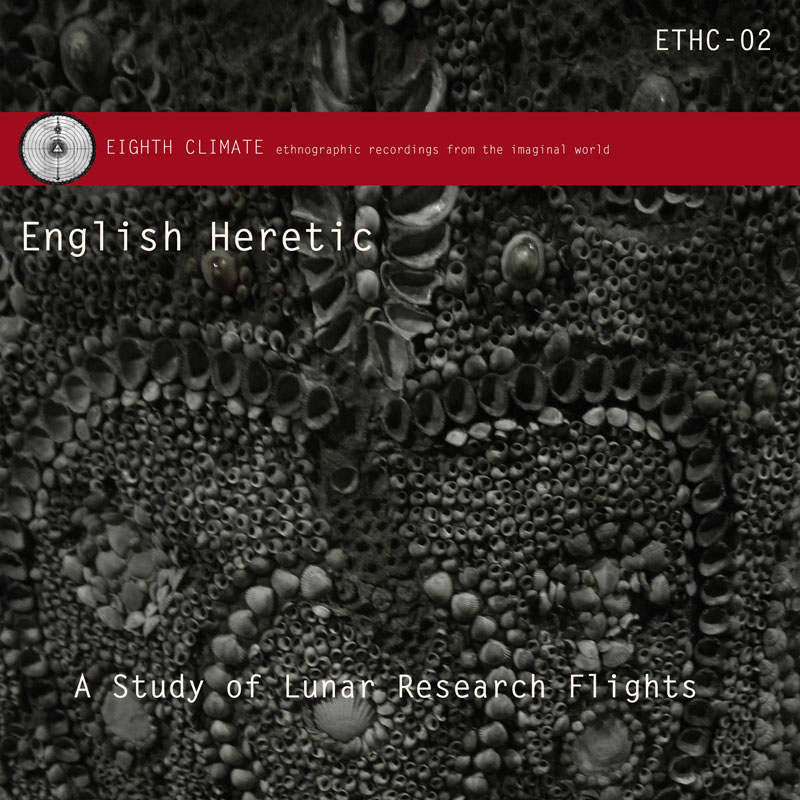Andy Sharp must surely be the hardest working man in occult psychogeography. Less than a year after The Underworld Service, his monumental and mesmerising treatise on the death impulse in Western culture, we now get A Study Of Lunar Research Flights, one of the launch releases on Sharp’s new imprint Eighth Climate, "ethnographic recordings from the imaginal world".
Since its inception in 2003, English Heretic has developed a distinctive and evocative sound palette that draws on post-punk, prog, folk, ambient and field recordings, yet each new release reveals another facet to the project, both thematically and sonically. While the sepulchral concepts of The Underworld Service produced music that was often luxuriantly dark and oppressive, the sound of A Study Of Lunar Research Flights is comparatively spacious and luminescent, while still retaining some hard edges; a formulation that could best be summed up as Brutalist kosmische.
The album takes its title and inspiration from Project A119, a secret US initiative from 1958 that looked at the feasibility of detonating an atomic bomb on the dark side of the moon, a crazed show of strength in response to the successful Russian launch of Sputnik. (And as such, the album acts as a bleak corrective to the space age Utopianism recently evoked on Public Service Broadcasting’s The Race For Space). Sharp takes this nugget of Cold War insanity and positions it as part of the age-old battle between the sun and the moon. In one of the more colourful passages from the accompanying booklet, he imagines that "such an experiment might cause a cataclysmic shift in the moon’s magnets, that it would bring out a huge menstrual tide of avenging feminism. Armies of Kalis and Hecates rampaging across syncretic blood-filled seas and white sands, wielding giant scythes, holding the shrivelled penises of emasculated NASA scientists."
The album functions as more of a consolidated whole than previous releases, with motifs and tonalities recurring throughout its seven tracks. ‘New Pyramids Of The Sun’ begins with synthetic sounds of ascension underpinned by a pre-emptory murmur of growling bass. Sharp’s voiceover describes his impressions of the overgrown concrete precincts of RAF Bawdsey, an abandoned missile base in Suffolk, now transformed into a Ballardian site for solar worship in this nuclear age of a thousand suns. Sustained psych guitar curls like thick vapour trails in the air, before harsh synth arpeggios and the beating of a funereal drum build towards a climactic epiphany.
The fabulously titled ‘Bring Down The Ashtar Galactic Command’ is inspired by a bizarre incident from 1977 when the regional TV news in the South East of England was over-ridden for five minutes by the words of Vrillon, an alien emissary delivering an anti-war message in the style of Klaatu at the conclusion of The Day The Earth Stood Still. An elaborate hoax whose perpetrators have never been identified, Sharp depicts Vrillon’s craft shot down by the military, the whirrs and stutters of its damaged flight deck gradually subsumed by a majestic, extraterrestrial drone and the dull rhythmic pounding on the outer hull of the army trying to break in.
‘We Arrive At Melqart In May’ is set in another alchemical portal – the astonishing-looking Shell Grotto in Margate (of all places) – and re-uses the same two chord tone-bed as ‘New Pyramids…’ There’s a beautiful moment when a higher layer of fluttering synth breaks through, like walking out again into the fresh air. ‘En Route To Rome With The Phallus Of Elagabal’ is darker and colder, a surge of sub bass oscillating into a processional throb beneath nerve-jangling digital interjections, before that abrasive psych guitar returns again in ‘Diagrams Of Sacrifice’, scouring the senses and burning an afterimage into the texture of the underlying drones.
The theme comes full circle in ‘White Swallows Are In The Red Forest’, which takes its cue from the mutant zoology that has evolved around Chernobyl, artificial strings and a manipulated folk refrain suggesting renewal in the crucible of disaster. Finally, ‘In Search Of… Tanit And Ba’al’ brings the album to a close with a stately, mournful lament (and also an accidental tribute to Leonard Nimoy, the recently-deceased host of the show referenced by Sharp).
Like much of English Heretic’s previous work, the shadow of apocalyptic thinking hangs over A Study Of Lunar Research Flights. In fact, it could be argued that much of the hauntological canon channels the cognitive dissonance of living inside the cold war logic of mutually assured destruction, perhaps the defining experience of growing up in the 70s/80s. If nothing else, it’s provided the psychic wellspring for a lot of great music over the past few years, and this album is a fine addition to this visionary lineage.
<div class="fb-comments" data-href="http://thequietus.com/articles/17389-english-heretic-a-study-of-lunar-research-flights-review” data-width="550">


